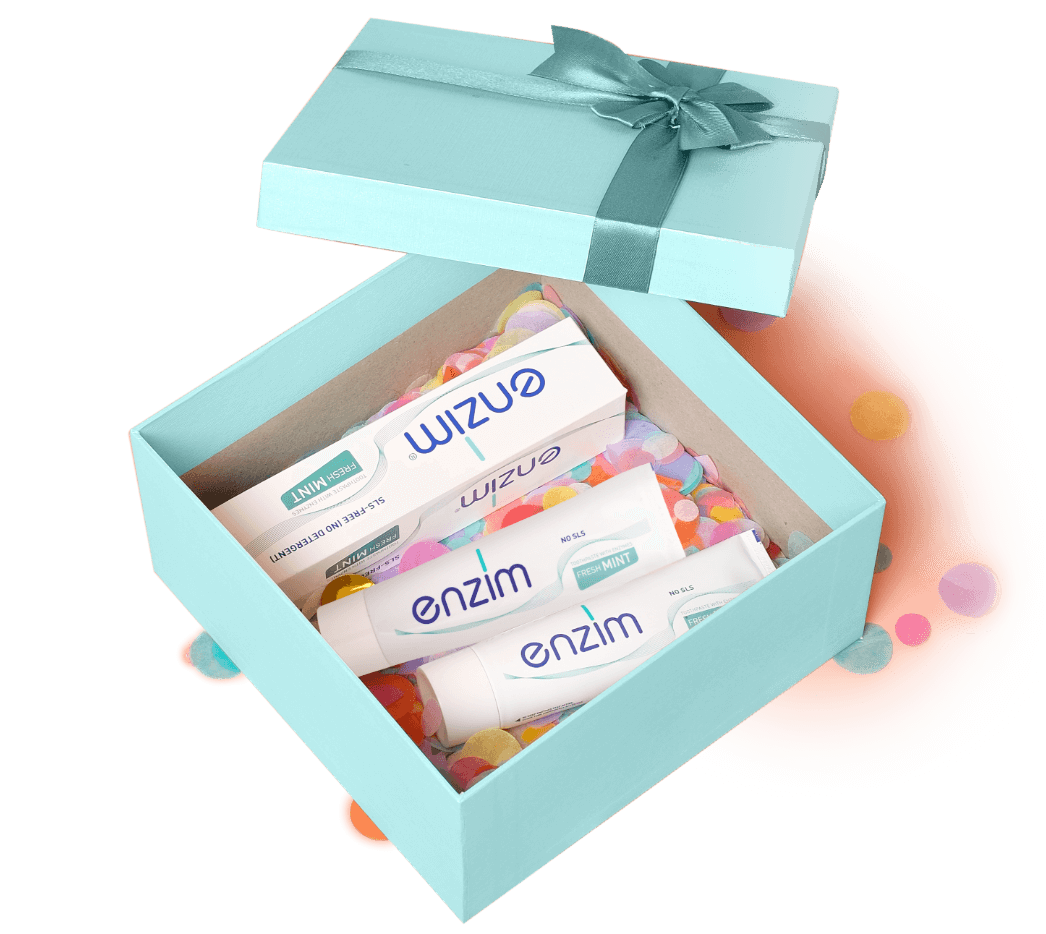Say Goodbye to Mouth Ulcers: Proven Treatments for Canker Sores

Say Goodbye to Mouth Ulcers: Proven Treatments for Canker Sores - Enzim Singapore
Mouth ulcers, also known as canker sores or aphthous ulcers, are small but mighty in terms of the discomfort they cause. Whether it's a stinging pain when drinking orange juice or a dull ache during a conversation, these sores on the mouth lining can interrupt your daily routine. But the good news is: you don't have to just wait them out. With the right approach, there are proven ways to relieve the pain and promote faster healing — and Enzim Toothpaste can be a key part of that solution.
In this article, we'll walk you through the causes of mouth ulcers, the best treatment methods (from home remedies to medical treatments), and how to build a daily routine that supports long-term oral comfort. We'll also discuss when a canker sore might indicate more serious complications and require professional attention.
What Are Mouth Ulcers?
Mouth ulcers are non-contagious sores that form inside the mouth, often on the inner cheeks, lips, tongue, or soft palate. They appear on the mouth lining and are round or oval with a white or yellowish center and a red border. Most are small and heal in 7 to 14 days, but larger or recurring ulcers may need targeted treatment.
A canker sore can appear as a single sore or in clusters. They are different from cold sores or fever blisters, which are caused by the herpes simplex virus and typically occur outside the mouth.
Common Causes of Mouth Ulcers
Understanding the cause of your mouth ulcer is the first step to effective treatment. Some of the most common causes include:
-
Minor injury to the mouth (accidental bite, dental braces, rough brushing, or a sharp tooth)
-
Emotional stress and lack of sleep
-
Vitamin deficiencies, especially B12, folate, iron, and zinc
-
Hormonal changes, especially in women
-
Certain foods, like citrus fruits, coffee, chocolate, hot drinks, or spicy dishes
-
Toothpaste or mouthwash containing Sodium Lauryl Sulfate (SLS)
-
Underlying health issues, such as celiac disease, Crohn's disease, or autoimmune conditions
-
Food intolerance
-
Tobacco use
-
Family history of recurrent canker sores
Proven Treatments for Mouth Ulcers
Mouth ulcers are generally self-limiting, but you can speed up the healing process and reduce discomfort with a variety of treatments.
1. Over-the-Counter (OTC) Gels and Creams
Products containing ingredients like benzocaine, hydrogen peroxide, or fluocinonide help numb the area and reduce inflammation. Apply these antiseptic gels directly to the sore 2–4 times a day, ideally after meals and brushing.
2. Mouth Rinses
Antimicrobial mouthwashes or salt mouthwash can keep the area clean and reduce the risk of infection. Chlorhexidine gluconate mouthwash or a steroid mouthwash is often prescribed for more severe ulcers.
3. Nutritional Supplements
If your ulcers are caused by a deficiency, your doctor may recommend supplements. Vitamin B12, folic acid, and iron are commonly linked to oral health.
4. Laser Therapy
For chronic or painful ulcers, low-level laser therapy (LLLT) is a newer treatment that promotes healing and offers instant pain relief.
5. Topical Home Remedies
If you prefer natural approaches, try these topical treatments:
-
Honey: antimicrobial and healing properties
-
Aloe vera: soothing and anti-inflammatory
-
Coconut oil: reduces pain and prevents infection
-
Chamomile tea compresses: relieves swelling
-
Milk of magnesia: forms a protective coating over the sore
These treatments can be rotated throughout the day, depending on your pain level and ulcer severity.
A Gentle Toothpaste Can Make All the Difference
Many people overlook their toothpaste as a potential source of irritation. But traditional toothpastes often contain Sodium Lauryl Sulfate (SLS) — a foaming agent that has been linked to canker sores in some individuals.
Switching to an SLS-free toothpaste like Enzim can reduce irritation and help ulcers heal faster. Here's why:
Benefits of Using Enzim Toothpaste for Ulcers:
-
SLS-Free Formula: Reduces the risk of tissue irritation and new ulcer formation
-
Enzyme-Based Ingredients: Supports the natural balance of good bacteria in the mouth
-
No Harsh Chemicals or Alcohol: Gentle enough for daily use, even when your mouth feels raw
-
Ideal for Sensitive Mouths: Soothes rather than stings, making brushing a pain-free experience
Enzim Toothpaste has become a go-to solution for people with recurring canker sores who want an effective and gentle oral care routine. It's especially helpful during recovery, when soft tissues are most vulnerable.
Building a Daily Healing Routine
If you're currently dealing with a mouth sore, follow this daily care plan to support faster healing:
Morning:
-
Use a soft-bristled toothbrush and brush with Enzim Toothpaste
-
Rinse with warm salt water or a mild, alcohol-free antimicrobial mouthwash
-
Avoid citrus juices and acidic foods for breakfast
Midday:
-
Reapply topical treatments after lunch
-
Stay hydrated — dry mouth can slow healing
-
Avoid chewing gum or spicy snacks
Evening:
-
Brush again gently with Enzim Toothpaste
-
Rinse with salt water before bed
-
Apply honey or aloe vera if you feel a burning sensation returning
Bedtime:
-
Get adequate sleep. The body heals best during deep rest
-
Try stress management techniques if emotional stress is a trigger for your ulcers
How Long Do Mouth Ulcers Take to Heal?
For most people, mouth ulcers go away in 7–14 days without intervention. With proper treatment and a supportive oral care routine, healing time can often be reduced by a few days.
However, you should see a dentist or doctor if:
-
The ulcer lasts longer than 3 weeks
-
You have multiple ulcers at once
-
You also experience fever, fatigue, or swollen lymph nodes
-
The ulcer becomes increasingly painful or large
These may indicate more serious complications that require medical attention, such as oral cancer or gastrointestinal disease.
Preventing Mouth Ulcers from Coming Back
The best long-term strategy for dealing with mouth ulcers is prevention. Here's how to reduce your chances of another flare-up:
-
Avoid toothpaste with SLS — switch to Enzim Toothpaste
-
Eat a nutritious diet rich in vitamins and minerals to support your immune system
-
Manage emotional stress with regular exercise or mindfulness
-
Drink plenty of water to stay hydrated
-
Don't skip meals — low blood sugar can be a trigger
-
If you wear braces or dentures, ensure they fit properly to avoid mouth injury
-
Maintain good oral hygiene, especially before bed
-
Avoid tobacco use and limit consumption of hot drinks
If your ulcers are recurring, keeping a symptom diary can help you identify personal triggers such as certain foods, stress, or hormonal changes.
Types of Mouth Ulcers
While most people experience minor canker sores, there are different types of mouth ulcers:
-
Minor canker sores: The most common type, these small ulcers heal within a week or two without scarring.
-
Major canker sores: Larger and deeper than minor sores, these can be extremely painful and may take several weeks to heal, often leaving a scar.
-
Herpetiform canker sores: These appear as clusters of tiny ulcers and are more common in older adults.
Understanding the type of mouth ulcer you have can help in choosing the most effective treatment approach.
When to Seek Medical Treatment
While most mouth ulcers can be managed at home, some situations require professional medical treatment:
-
If you experience a burning or tingling sensation before the ulcer appears
-
When ulcers are unusually large or painful
-
If you have frequent outbreaks
-
When ulcers don't heal within three weeks
-
If you have difficulty eating or drinking due to pain
In these cases, a doctor may prescribe stronger treatments, such as steroid mouthwash or immunosuppressant medication, or conduct blood tests to rule out underlying conditions. They may also check for more serious issues like mouth cancer or complications related to medications like beta blockers, bisphosphonates, or nicorandil.
Final Thoughts
You don't have to suffer through mouth ulcers in silence. With the right treatment strategy, including home remedies, over-the-counter solutions, and a gentle toothpaste like Enzim, you can relieve the pain and support faster healing.
Remember, oral care plays a huge role in both the treatment and prevention of ulcers. By switching to Enzim Toothpaste, you're choosing a formula that respects the balance of your mouth's ecosystem — all while keeping things clean, fresh, and irritation-free.
Say goodbye to canker sores and hello to relief — naturally, gently, and effectively.
